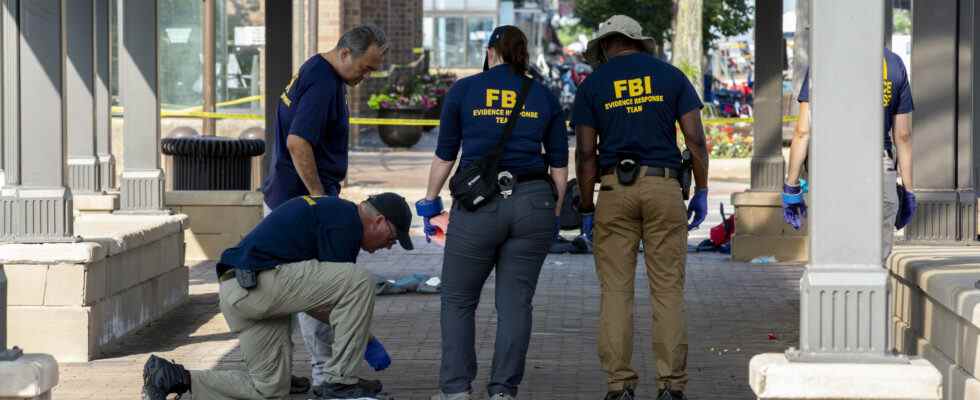A new spate of deadly mass shootings within the past two months has brought the issue of gun violence back into the spotlight in America, with politicians struggling to deliver meaningful reform or otherwise prevent further tragedies.
As has been the case before, pundits and politicians have attempted to prematurely determine the motives for these killings, often without sufficient evidence or nuance, well before official investigations have concluded.
Much like shootings in Uvalde and Buffalo, it has taken little time for speculation to brew following the deaths of seven people in Highland Park, Illinois on July 4, 2022.
Jim Vondruska/Getty Images
Within less than 48 hours of the attack, a now-familiar narrative blaming psychiatric drugs has resurfaced, in spite of little information at the time about the alleged perpetrator’s life.
Among these were a series of tweets sent on July 5, 2022, Rep. Marjorie Taylor Greene (R-GA) suggested a link between “psychiatric drugs” and “SSRIs”—selective serotonin reuptake inhibitors—and the events in Highland Park.
The guy made rap videos about school shootings or being killed in a hale of bullets by police and was “known to the police.”
The public deserves to know why!
Release his records, school record, arrest, drugs and prescription drugs, hospitalizations, psychiatric.
— Rep. Marjorie Taylor Greene🇺🇸 (@RepMTG) July 5, 2022
While Greene’s earlier claims seemed to be speculative, further posts implied a much stronger relationship between the killings in Illinois and the use of psychotropic medication.
When are we going to have an honest conversation about drug abuse, mental illness, and SSRI’s???
And deadly side effects.
Are we really going to keep pretending?
Or covering for Big Pharma?
Because I’m absolutely done with the political plays on this BS. pic.twitter.com/8SkNpSOYWW
— Rep. Marjorie Taylor Greene🇺🇸 (@RepMTG) July 5, 2022
When are we going to talk about drugs and SSRI’s?
When are they going to release the shooters records?
Why wasn’t his threats of mass shootings in his videos taken seriously by LE that knew about him?
What did his parents know?
Gun control won’t stop this epidemic of evil.
— Rep. Marjorie Taylor Greene🇺🇸 (@RepMTG) July 5, 2022
This has now formed a pattern of claims made by Greene and some other conservatives on Twitter, which came to prominence after the Robb Elementary School shooting in Uvalde, Texas.
12. This often leads to prescriptions of medications to treat the damaged mental state of these soon to be shooters.
Taking meds like SSRIs have dangerous side effects that can no longer be ignored.
Among many other side effects they can cause suicidal and homicidal thoughts.
— Rep. Marjorie Taylor Greene🇺🇸 (@RepMTG) May 25, 2022
These claims spread further following a monologue by Fox News host Tucker Carlson, who drew a similar comparison.
Tucker Carlson: “Between 1991 and 2018 total SSRI prescriptions in the United States rose by more than 3,000%!”
Tucker shows how over that same period of time suicides and mass shootings didn’t go down, but instead went up. pic.twitter.com/DWXHLt1VEI
— The Columbia Bugle 🇺🇸 (@ColumbiaBugle) July 6, 2022
#Tucker is right that “mental health” SSRI drugs are over-prescribed in this country.
The solution to our problem of sin is the Gospel, not drugs.
— Jenna Ellis (@JennaEllisEsq) July 6, 2022
The link between mass shooters and SSRI usage goes back almost a decade
-using a brain altering drug that makes you emotionally numb, and combining that with violent tendencies
It’s good this question is being talked about, SSRI abuse is an epidemic by itself
— Alexander Cortes PhD, Fitness, Nutrition, Fat loss (@AJA_Cortes) July 5, 2022
It’s worth first repeating that in the immediate aftermath of the tragic incident in Highland Park, relatively little was, and still is, known about the alleged perpetrator, Robert “Bobby” Crimo III.
Nonetheless, theories about Crimo, who has been charged with seven counts of first-degree murder, quickly disseminated, profiling him both as a pro-Donald Trump “MAGA” supporter and a follower of the Antifa cause based on social media posts alone.
Reports began to emerge in the aftermath of the shooting that suggested that Crimo had a history of poor mental health, including a statement by police that he had attempted suicide in 2019.
Of course, reports of Crimo’s mental health alone do not prove he was taking or had taken SSRIs or other antidepressant medications.
Much like the inferences made about his political sympathies, the claims about SSRI antidepressants appear to have been made in haste, as there is still much we do know presently know about Crimo’s life, including his medical history.
Greene has made similar claims before. The day after the Uvalde school shooting, the congresswoman took to Twitter defending gun ownership and theorizing why mass shootings take place.
Among her claims were that mass shooters were “susceptible to depression, anxiety, thought disorders” which led them to taking “meds like SSRIs [which] have dangerous side effects that can no longer be ignored. Among many other side effects they can cause suicidal and homicidal thoughts.”
“Most school/mass shooters have taken or recently stopped taking medications for mental illness,” she wrote. “Taking or going off & on these meds can increase instability and often times exasperate mental health problems instead of helping to solve the underlying emotional crisis.”
Again, of what information existed about the Uvalde perpetrator (some of which was fabricated) there were no reports then or since as to whether he had taken SSRIs or antidepressants. Greene had implied a link for which there was no known evidence.
Whether the Uvalde or Highland Park shooters took antidepressants, the wider question of whether antidepressants cause mass violence is also much more complex than these commentators purport.
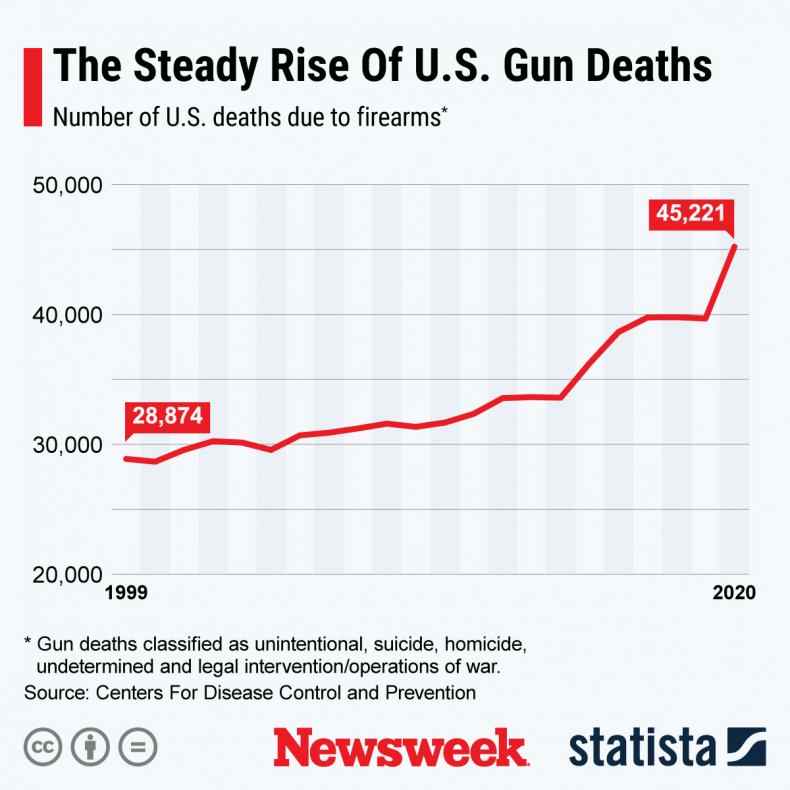
Statista
In their commentary, Greene and Carlson honed in on the effects of these drugs on young people, for which there is some basis.
Responding to Newsweek, Fox’s spokesperson highlighted a 2015 report which claimed that SSRIs were “modestly associated” with violent crime in participants aged 15-24 “but not significant for individuals aged 25 and older.”
They also pointed to an FDA warning that states: “Pediatric patients being treated with antidepressants for any indication should be closely observed for clinical worsening, as well as agitation, irritability, suicidality, and unusual changes in behavior, especially during the initial few months of a course of drug therapy, or at times of dose changes, either increases or decreases.”
While there are some reports and data that suggest antidepressants may be linked to violent thoughts or tendencies, there is also considerable evidence of an opposing view.
Professor Peter Kinderman, a professor of clinical psychology at the U.K.’s University of Liverpool and author of the 2019 book A Prescription for Psychiatry: Why We Need a Whole New Approach to Mental Health and Wellbeing, told Newsweek that the claims made by Greene, Carlson, and others “are controversial, based on massive extrapolation from scanty data, and lead to conclusions that are unsupported, through that process of extrapolation, and harmful.”
“There is some evidence that SSRIs are associated with suicide (paradoxically, since they are purported to be antidepressants) and impulsive behavior, but links to violence are mainly anecdotal. I don’t know of any clear links to mass shooter incidents. It is true that some shooters have been prescribed SSRIs, but they’re very common.”
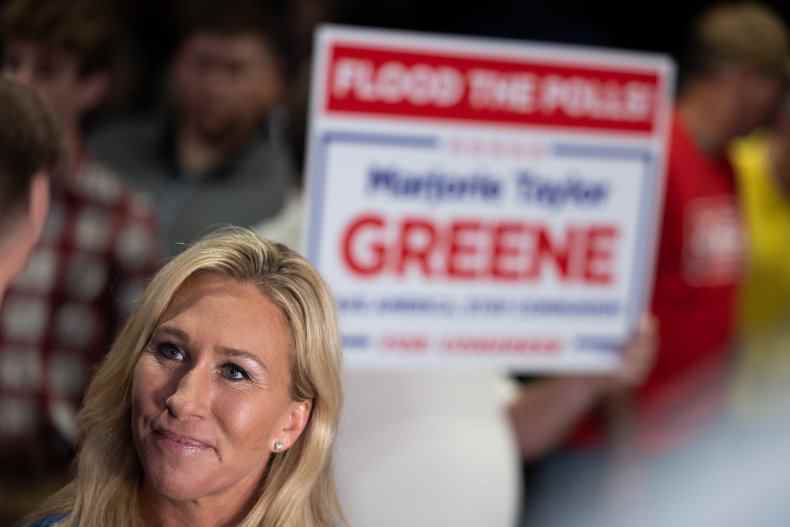
Jessica McGowan/Getty Images
Carlson, while stating during his monologue that there was no definitive connection, asserted that the increase in mass shootings in the U.S. was correlated with a rise in the use of antidepressants.
But these two sets of statistics brought together are not necessarily proof of a significant relationship—correlation does not equal causation, which is a point that the host himself referred to, albeit dismissively.
One could easily use the same argument to divine that the increasing number of video game players, another trend blamed for mass shootings, follows the same pattern. Even seemingly unrelated variables such as the rise in veganism or the amount of people who own more than one car have increased in tandem over a similar period.
Carlson also mentioned that a number of shooters, including Eric Harris and Dylann Roof, took antidepressants.
A Fox News spokesperson provided Newsweek with several other examples as well as articles examining the use of antidepressants among mass shooters. Among them was an article by the BBC profiling Aurora culprit James Holmes.
The article goes into detail about his use of the SSRI sertraline (marketed in the U.S. as Zoloft). Several interviewees in the article claim that sertraline may have been responsible for Holmes’ actions.
Among these was Professor David Healy, a professor of psychopharmacology who has written extensively about the side effects of antidepressants. Healy was hired as an expert in the Holmes trial and visited him in jail.
Speaking to the BBC, Healy said: “These killings would never have happened had it not been for the medication James Holmes had been prescribed.”
A BBC News investigation on the same subject also included statistics that showed that in the U.K., antidepressants were linked to 28 reports of murder and 32 cases of murderous thoughts over a 30-year period.
However, what the Fox News host’s theory does not explain is that in many cases shooters were not on any medication at all, and that even for those who were it was more likely that the underlying mental issues were what influenced their decision-making.
As court psychiatrist Dr. William Reid, who interviewed Holmes before the trial, told the British broadcaster, the killings were “completely unrelated to the medication.”
The BBC article mentions that Holmes’ withdrawal from sertraline precipitated the Aurora shooting and adds: “What Holmes was struggling with—mental illness, the side effects of his legally prescribed medication or a combination of the two—we may never know for sure.”
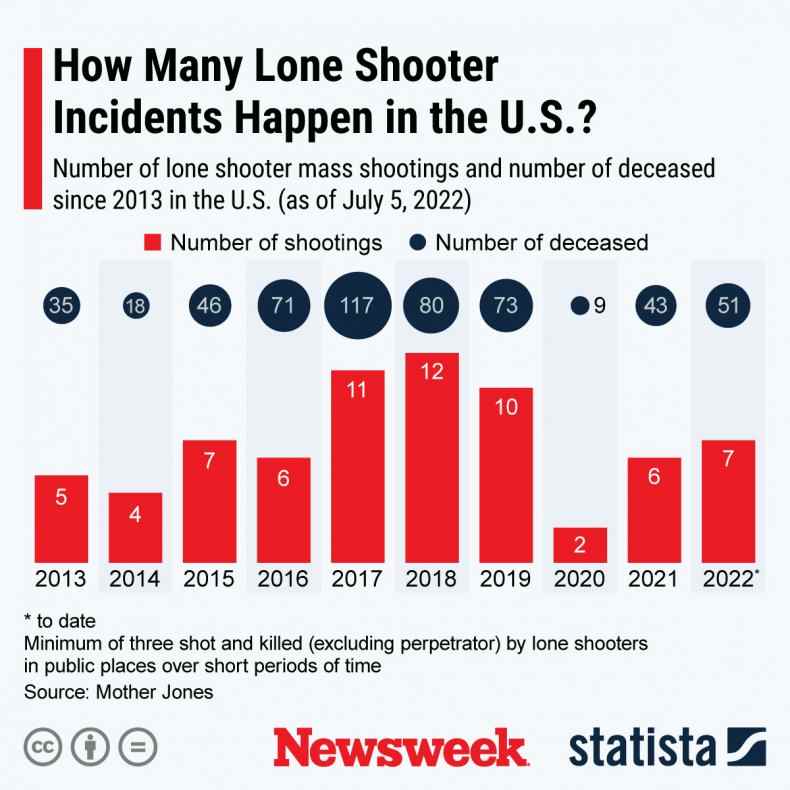
Statista
It is worth noting just how widespread the use of antidepressants and other prescription drugs is across the U.S.
The U.S. Centers for Disease Control and Prevention found in a household survey of the U.S. that 16.5% of adults took antidepressants (SSRIs being the most commonly prescribed). A report by the CDC from 2017 found use among persons aged 12 or older between 2011-2014 was 12.7%.
And there is also a wide body of other evidence that describes a far looser link between antidepressants and mass shootings.
An investigation in 2021 by Voice of America of mass shootings from 1966 to February 2020 found that only 23 percent of mass shooters during this period were taking psychiatric medication, undermining the supposed link with SSRIs; more than three-quarters of mass shootings were committed by individuals not taking such medication.
Meanwhile, the same report also found that two-thirds of the mass shooters taking psychiatric medication had a history of mental health concerns, supporting the idea that the psychological issues—not the prescribed treatments—were the underlying factor.
More recent studies also suggest the mental health link is less robust than many believe it to be, especially in comparison to other factors.
A 2021 study by Columbia University Irving Medical Center, which examined the influence of mental health issues on 1,315 mass murderers of all types from 1900 to 2019, found that while “policies aimed at preventing mass shootings by focusing on serious mental illness, characterized by psychotic symptoms, may have limited impact…. those targeting firearm access, recreational drug use and alcohol misuse, legal history, and non-psychotic psychopathology might yield more substantial results.”
Professor David Nutt, a former U.K. government advisor on drug policy and one of the leading voices in psychopharmacology, said Greene’s claims were “not at all” clear-cut.
“I have never seen any scientific research [on the topic of antidepressants and mass shootings] though, to be honest, it would be hard to do as these events are thankfully rare,” Nutt said.
“It is questionable if many of these killers are mentally ill with an illness that would lead to this form of planned killing. I’m not sure [investment in mental health] would make any real difference [to the number of mass shootings]. Most mentally ill people don’t become killers so you would have to ‘cure’ hundreds of thousands to prevent a single massacre.”
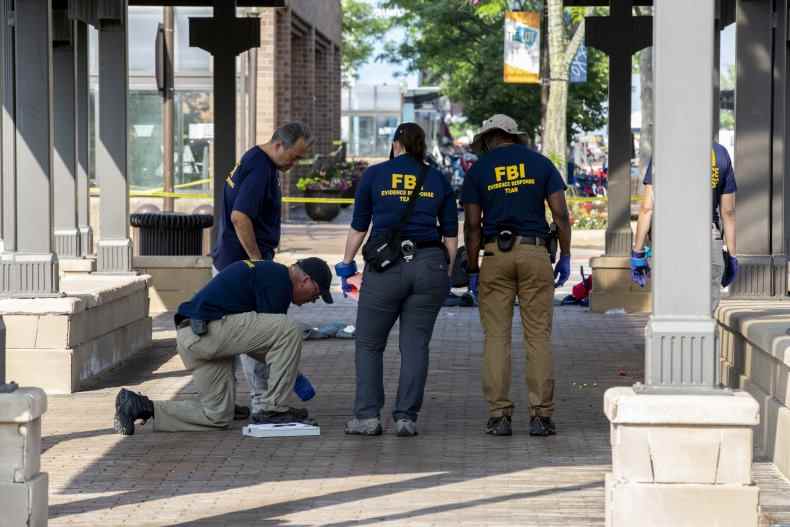
Jim Vondruska//Getty Images
David Herzberg, an associate professor of history at the University of Buffalo and author of the 2009 book Happy Pills in America: From Miltown to Prozac, said that putting the blame on drugs meant not having to engage with stronger influencing factors, such as “previous personal/private violence against women, and the obvious link between the popular availability of weapons of war and higher body count.”
“In addition to the long history of pro-drug marketing associated with pharmaceuticals, there has also been a strong counter-current of ‘pharma-skepticism,’ nurtured in part by continued visible wrongdoing on the part of pharmaceutical companies—the opioid crisis is only the latest (and worst) of a century of public health crises related to pharmaceutical profit-seeking,” Herzberg said.
“For many good reasons, many Americans are uncomfortable with the overt commercialization of healthcare, and thus have been quite receptive to critiques of the pharmaceutical industry, which is probably the most omnipresent visible example of such commercialization, certainly in the past 40 years since direct-to-consumer advertising has been allowed.”
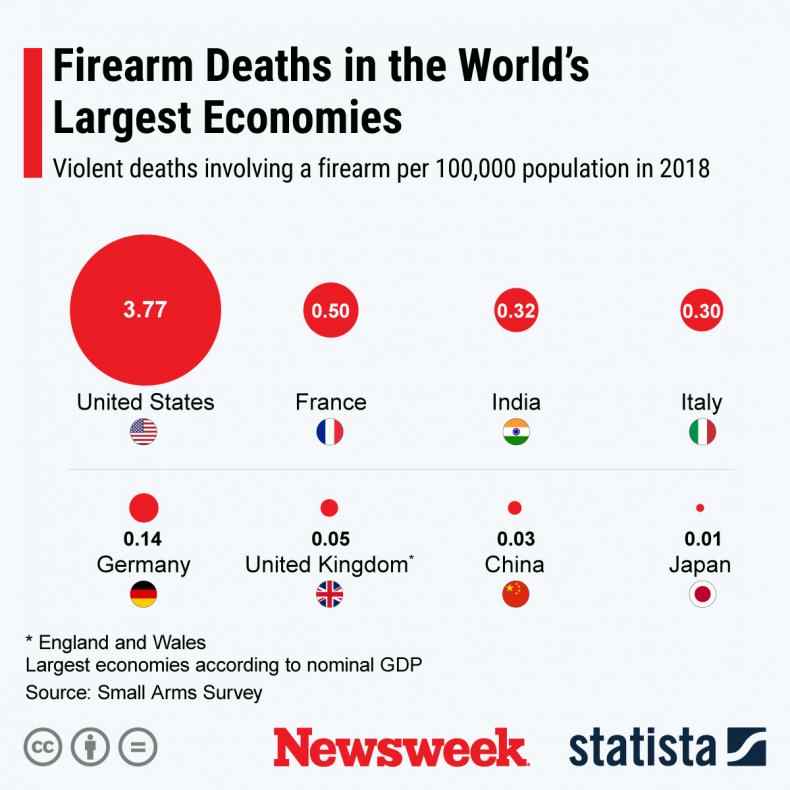
Statista
It is likely that claims linking psychotropic drugs and incidences of mass shootings will continue, in much the same way that pundits have consistently attempted to draw connections before.
There is also little doubt that a mental health crisis is very much on the cards in many parts of the U.S., and evidence suggests it has been exacerbated by the COVID pandemic.
However, while to an extent there is a relationship between access (or lack thereof) to mental health support for serious mental illnesses and violence, a conclusive link with antidepressants has not so far been established.
Greene, a vehemently pro-firearm politician, has made other questionable claims in the wake of previous mass shootings, such as that more gun deaths and mass shootings take place in Democratic-controlled areas. Newsweek previously found that Greene also had helped perpetuate mistruths that other mass shootings were staged or deep-state conspiracies.
Notably, just this week she voted against the Restoring Hope for Mental Health and Well-Being Act, a package of measures aimed at addressing substance abuse and mental health issues in the U.S.
Carlson too has made other dubious claims. In the same show in which he talked about the influence of SSRIs on the Highland shooting, he also suggested that women lecturing men about male privilege was a contributing factor.
Whether or not there is any factual basis to these assertions, their timing—when scant confirmed information is available about the shooters because investigations are ongoing—puts a big question mark over their credibility.
Newsweek has contacted Greene for comment.
